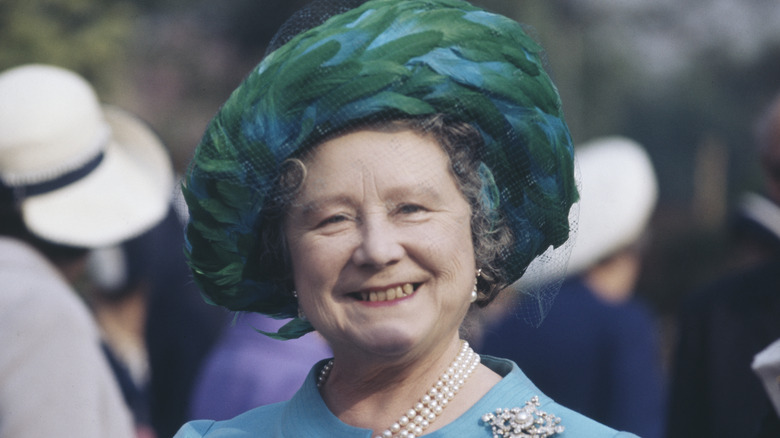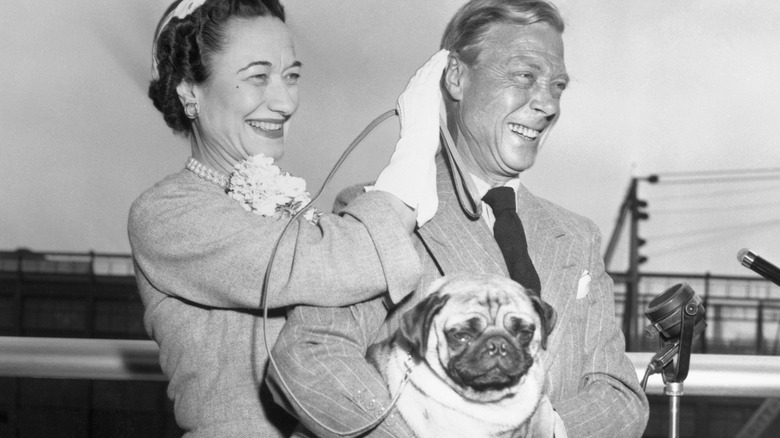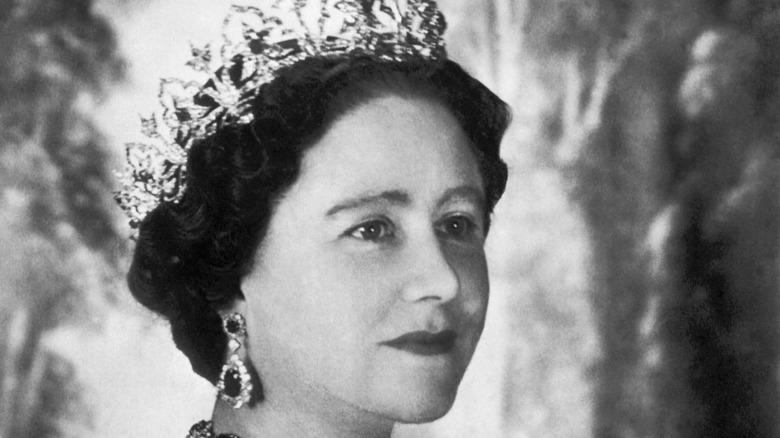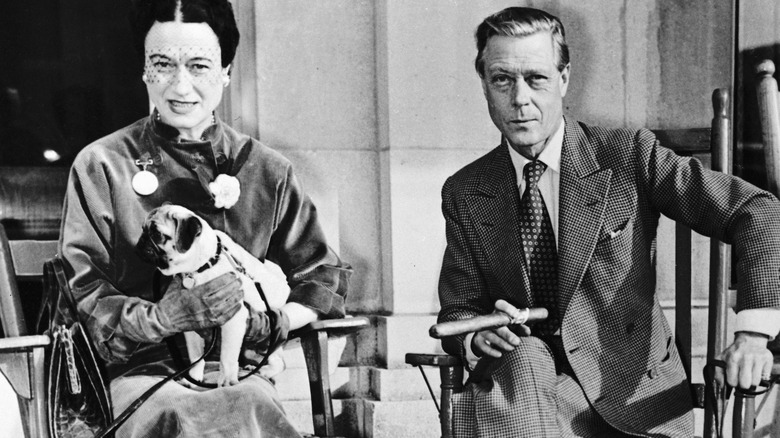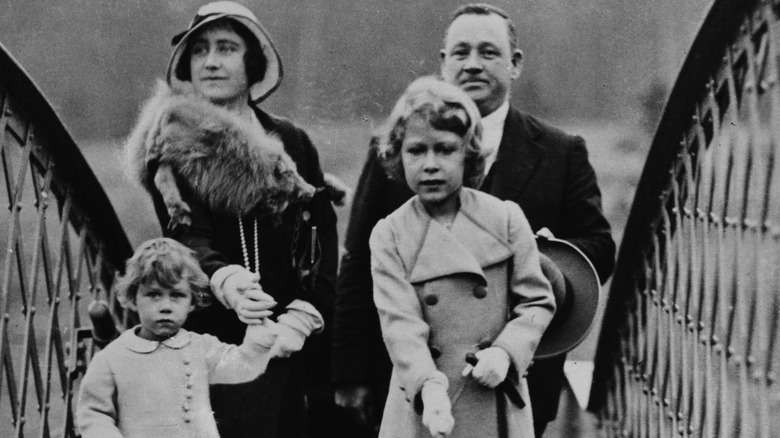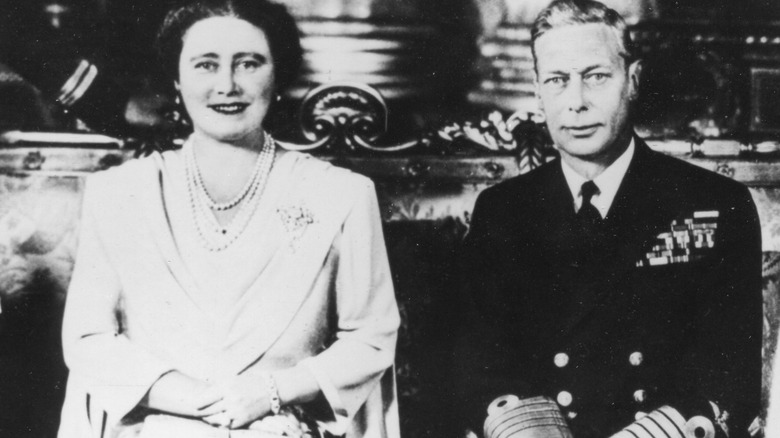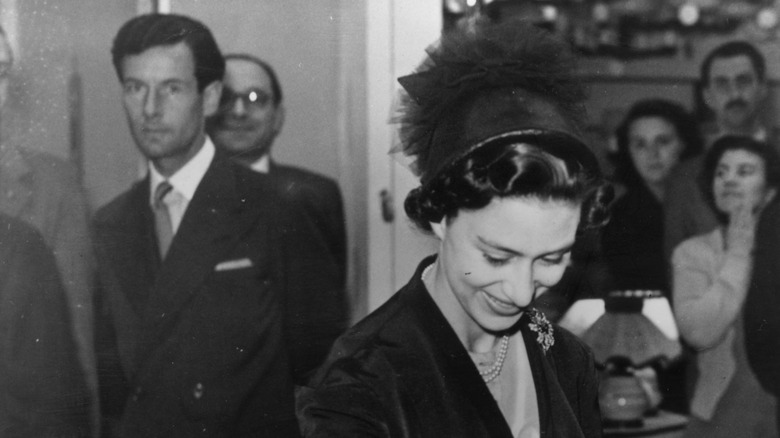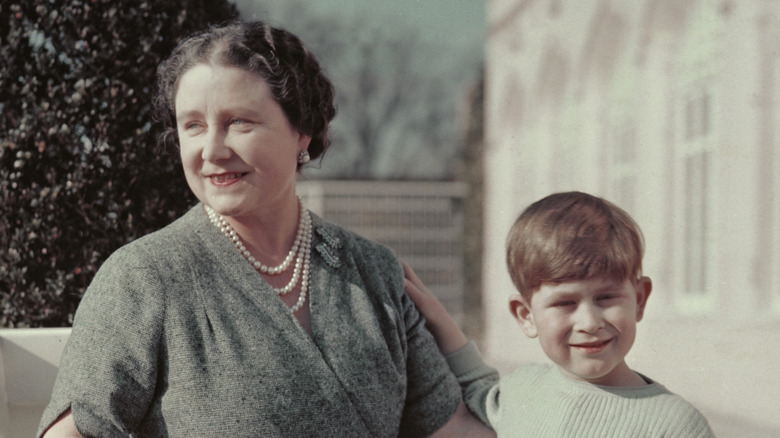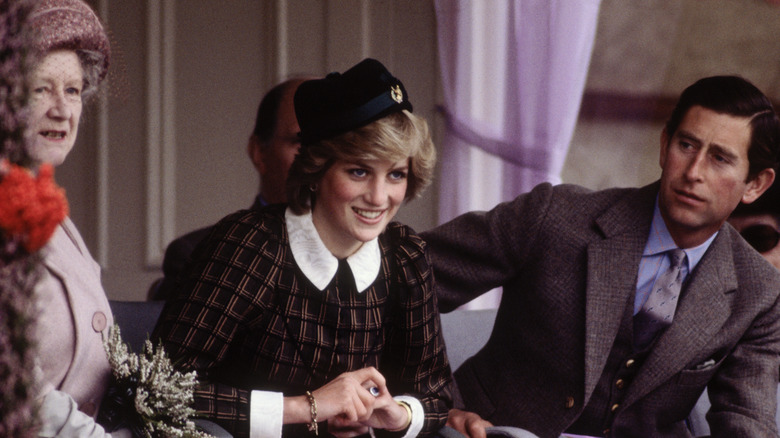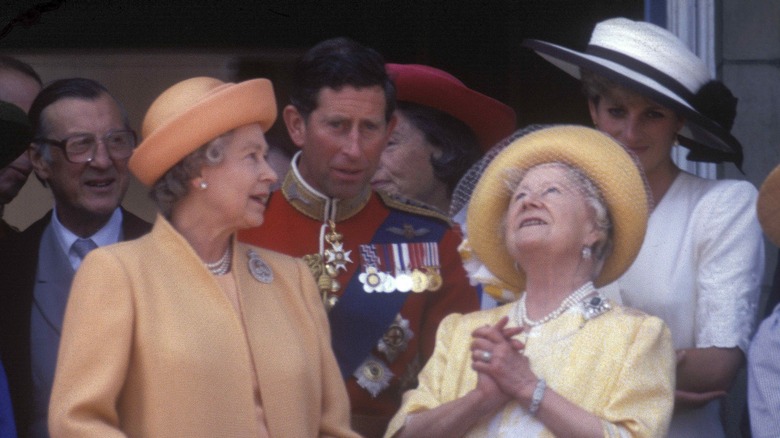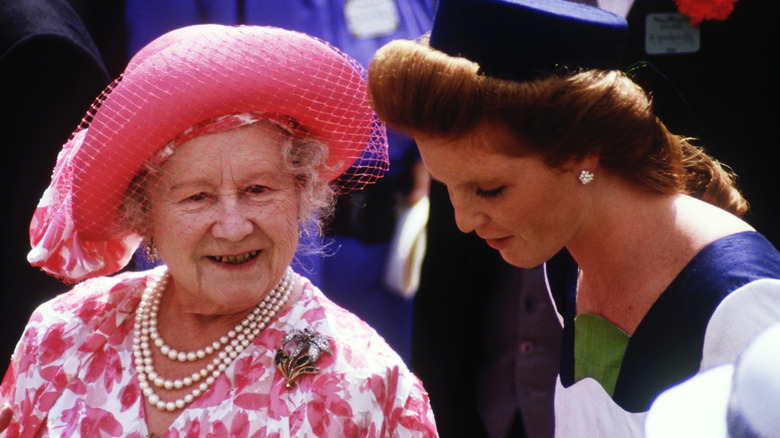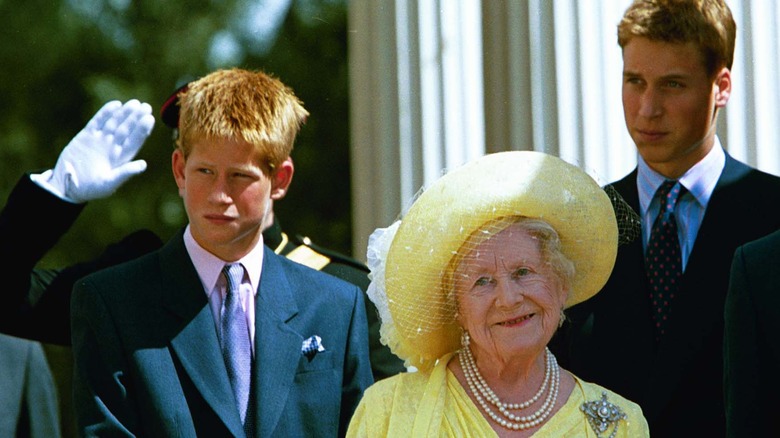The Queen Mother's Influence On The Royal Family Was Felt All Around
Queen Elizabeth, The Queen Mother was born Elizabeth Angela Marguerite Bowes-Lyon on August 4, 1900. Her father, Claude George Bowes-Lyon, could trace his lineage to Robert, the Bruce, who served as the King of Scotland in the 14th century. During Elizabeth's childhood, Claude bore the title of the 14th Earl of Strathmore and Kinghorn. Thus, she was raised in Graham's Castle, a prominent Scottish estate that had remained in her family since 1372. Speaking in the documentary, "The Marvelous Life of The Queen Mother" (via YouTube), royal biographer, Sarah Bradford, explained: "The Bowes-Lyons were a very old family going back to God knows whom in Scotland. And, they were also very rich ... They owned several castles [and] a huge house in St. James' square in London."
When Elizabeth married Prince Albert in 1923, it was hardly a surprise to her family, who never doubted that she was upper-crust enough for royalty. However, everyone — including Albert and Elizabeth — was caught off-guard when they were crowned king and queen consort, respectively, in 1937. Until December 1936, it was thought that Albert's older brother, King Edward VIII, would go through with his coronation. Instead, he abdicated the throne in order to marry the controversial American divorcée, Wallis Simpson. Albert was crowned King George VI in his place.
From the moment of her coronation until her death in 2002, Elizabeth shaped the British royal family. Over the years, she influenced Edward's exile, WWII policies, and even Prince Harry's spare complex.
Queen Mother helped organize King Edward's exile
In 1936, King Edward VIII astonished all of Britain when he announced that he would abdicate the throne in order to marry Wallis Simpson. In a controversial radio statement broadcasted on the BBC, Edward told the public: "A few hours ago, I discharged my last duty as king and emperor. And, now that I have been succeeded by my brother, the Duke of York, my first words must be to declare my allegiance to him. This I do with all my heart" (via YouTube). Thus, King George VI, whose given name was Albert, took the throne.
Following George VI's ascension, however, his wife, Elizabeth, then-Queen Consort, grew intent on exiling Edward and Wallis from Great Britain. For one thing, she was apparently disgusted by Wallis' status as a divorcée. Indeed, in a letter that Elizabeth wrote to her mother-in-law, the widowed Queen Mary, prior to the abdication scandal, she referred to Wallis as a "naughty lady" (via Express). For another thing, though, she was concerned about what the abdication scandal would mean as far as the public's respect for the monarchy.
Speaking in the documentary, "Queen Mum: The Reluctant Queen" (via Express), royal biographer, Philip Ziegler revealed that he once asked Elizabeth why she had sent Edward and Wallis into exile. Apparently, Elizabeth told him, "You can't have two kings, can you?" In other words, Elizabeth worried that having two kings in England at the same time would threaten the monarchy's legitimacy.
She humiliated Wallis Simpson
During the 1930s, Elizabeth, then-Queen Consort did everything in her power to send Wallis Simpson into exile. But, she didn't stop there. Elizabeth was said to dislike Wallis so much that she dissuaded the upper crust of British society from attending her wedding to the former King Edward VIII. In the documentary, "Queen Mum: The Reluctant Queen" (via Express), royal expert Jane Ridley explained that Edward "thought the whole royal family would turn up for the occasion. But, they did not. This was very much the work of the Queen. She thought it would be very wrong for the king to extend his approval towards his brother." In the end, no more than two dozen people attended Edward and Wallis' wedding in Tours, France.
As if that snub were not impactful enough, Elizabeth denied Wallis the title of Her Royal Highness. At the time, this would have been seen as particularly humiliating, as it would have meant that nobody could curtsy to Wallis in England. Speaking in the documentary, "The Royal Wives of Windsor" (via Express), royal historian Piers Brendon explained the significance of this decision: "It was denied largely because Queen Elizabeth blamed Wallis Simpson for her husband's trauma that he suffered having to be King ... Elizabeth carried a long vendetta against the Windsors as a result of that. The key element in that vendetta was depriving Mrs. Simpson of the title of HRH."
The Queen Mother prevented Edward and Wallis from ever obtaining forgiveness
Over the years, Elizabeth, Queen Consort might have decided to let bygones be bygones. However, she never permitted her brother-in-law and Wallis Simpson to obtain forgiveness for the abdication scandal. Writing for The Daily Mail, royal correspondent Michael Thornton recalled a conversation that he had with Edward and Wallis in Paris during the spring of 1971. Apparently, Thornton asked the duo about their relationship with Elizabeth. Edward reportedly told him: "Behind that great abundance of charm is a shrewd, scheming, and extremely ruthless woman. But, of course, you cannot quote that."
Wallis, meanwhile, opened up to Thornton about Elizabeth's role in her and Edward's exile. She relayed that going back to England was a dream of theirs. However, in her view, this would always be impossible due to Elizabeth's unwillingness to grant them forgiveness. Wallis explained that Edward "would have loved to return to live in the land of his birth, but our way was blocked at every turn. We were never allowed to go back, and we never will be allowed. Not until the day we die. [Elizabeth] will never permit it. When we are dead, perhaps she may at last forgive us."
When Wallis and Edward passed away, Elizabeth's daughter, Queen Elizabeth II, forgave the couple — or, at least, partially. In the end, she allowed the pair to be buried in the royal burial ground, albeit far away from the other graves.
She decided to stay in London with the princesses during the war
During World War II, Great Britain faced unprecedented challenges, as the nation was targeted by the Nazi Air Force. German Luftwaffe planes would tear through the skies dropping bombs on its British marks. During this time, London was an especially dangerous place, as the Nazi Blitz repeatedly raided the capital city. Consequently, many Londoners, especially children, escaped to the countryside in hopes of finding safety.
Naturally, there was a lot of pressure for Elizabeth, Queen Consort to leave the city and take her young daughters, Princess Elizabeth and Princess Margaret, along with her. Nonetheless, the elder Elizabeth insisted on remaining in the London area– even after Buckingham Palace was bombed. Shortly following the attack, the queen consort wrote her mother-in-law, Queen Mary. In this letter, Elizabeth declared: "The children will not leave unless I do. I shall not leave unless their father does, and the king will not leave the country in any circumstances, whatever" (via The Guardian). This statement reflected Elizabeth's personal role in the royal family's decision to stand by its people during this tough moment.
Interestingly, staying in London was not the only way that Elizabeth showed her solidarity with the people. She also joined the war effort in her own gentil way. As explained in the documentary "The Marvelous Life of The Queen Mother" (via YouTube), "Elizabeth joined the war effort in a knitting campaign with other ladies at Buckingham Palace."
The Queen Mother influenced King George's decisions
Edward, Duke of Windsor and Wallis Simpson weren't the only royals to be impacted by Elizabeth during her time as Queen Consort. Elizabeth's husband, King George VI, was also said to receive her input before making any major decisions. According to one of her acquaintances, a historian by the name of Kenneth Rose, Elizabeth held more sway over George than any of his advisors. In William Shawcross' book, "Queen Elizabeth: The Official Biography of the Queen Mother," Rose was quoted saying: "The king would have a discussion with his private secretary Sir Alan Lascelles and instruct him to do one thing, only for the King to come back the next morning and change his mind. The strong inference was that the Queen Mother had persuaded him to change his mind" (via Express).
Perhaps, part of Elizabeth's hold over George pertained to the differences in their dispositions. While he was known for being soft, Elizabeth was famous for her tough character. Speaking in the documentary, "The Royal House of Windsor," royal expert, Piers Brendon, posited, "The Queen Mother provided the kind of backbone that ... [the king] had lacked" (per Express). Ultimately, this gave her the chance to slowly sway George's political leanings. Over the years, Elizabeth, who was always a staunch right-wing conservative, convinced Albert to become more conservative himself.
She was opposed to Princess Margaret's romance with Peter Townsend
In 1955, Queen Elizabeth, The Queen Mother watched her daughter, Princess Margaret, cause the greatest royal scandal since King Edward VIII's abdication. Like Edward, Margaret fell in love with a commoner and a divorcé — in this case, Captain Peter Townsend. And, like the former king, Margaret was faced with a fateful decision. She could choose to either marry Townsend and abdicate the throne, or break up with him and maintain her titles. Ultimately, Margaret valued the crown over her romance, and she ended things with the captain. However, this did not prevent Elizabeth from despising her daughter's suitor.
Once Margaret had finally made up her mind, she decided to meet up with her lover one last time. Following this final tryst, the princess went home to Clarence House with a broken heart. According to Hugo Vickers' 2005 biography, "Elizabeth, The Queen Mother" (via The Guardian), the queen mother was not home waiting for her daughter when she arrived. Instead, Vickers wrote, "Queen Elizabeth was due to keep an evening engagement at the University of London. The Queen Mother set off for this, unaware or unconcerned that her daughter would be having dinner alone on a tray."
Sadly, this might have contributed to the notoriously tense relationship between Elizabeth and her daughter. As Margaret's friend, Ann Glenconner, wrote in her book, "Lady in Waiting," there were frequent "bouts of bickering between the Queen Mother and Princess Margaret" (via Express).
The Queen Mother nourished King Charles' sensitive side
King Charles III did not have a normal childhood. As the son of Queen Elizabeth II, the young Charles was often expected to go long stretches of time without seeing his mother. This was especially true in 1953 when the younger Elizabeth and Prince Philip went on a six-month-long tour of the Commonwealth. During this time, Charles, who was then just five years old, remained in England with his nannies.
Interestingly, however, Queen Elizabeth, The Queen Mother stepped up to give her grandson a bit of extra-familial support. She was especially invested in nurturing Charles' sensitive side. In an episode of the podcast, "Royally Obsessed" (via Express), royal expert Roberta Fiorito explained: "It seems like [Charles] felt that the queen and Prince Philip were a little bit absent from his childhood, but he did have someone who really indulged his artistic side in the queen mother." In Fiorito's view, Elizabeth did a great job of helping Charles develop his interests. She shared, "We know now how that played out: he recites Shakespeare on the fly and loves painting and watercolors."
While Elizabeth, it seems, had a positive influence on the young Charles, some experts believe that she had ulterior motives. In the documentary, "The Royal House of Windsor" (via Express), historian Piers Brandon theorized that "she'd felt that she could exercise over Charles the kind of influence that she'd exercised over [her husband]."
She tried to impact King Charles' relationship with Diana
Following King Edward VIII's abdication, Queen Elizabeth, The Queen Mother, worked tirelessly to restore the reputation of the monarchy in the eyes of the British people. Thus, she was unhappy with the way that Princess Diana spoke so publicly about the issues in her marriage with King Charles III. In Elizabeth's eyes, after all, the media surrounding their divorce diminished the legitimacy of the royal family. Speaking in the documentary, "The Queen Mother: Grandmother to the Nation" (via The Daily Mail), royal expert Jennie Bond revealed that the scandal "was double hard for Queen Mother, as her and her husband George VI had played such an important part in resurrecting the image of the monarchy to see all that work pulled apart."
Because of this, Elizabeth tried to convince Diana and Charles to stay together. In the same documentary, royal expert Tom Quinn explained that the queen mother "thought Diana had a sort of fairytale view of how relationships should be, and conducted, and was quite impatient thinking she should grow up." Indeed, she apparently could not understand why Diana couldn't make room for Camilla in the marriage. Not everybody in the royal family supported Elizabeth's view. Quinn said, "There were certainly elements with the royal family who thought the Queen Mother was meddling and interfering in things she didn't understand." After all, open marriage arrangements were "no longer something that would work well in the world Charles inhabited."
The Queen Mother helped isolate Diana from the rest of the family
When it came to his relationship with Princess Diana, King Charles III was, ultimately, unable to take Queen Elizabeth, The Queen Mother's advice. On August 28, 1996, Charles and Diana were officially divorced. Following the couple's separation, the queen mother played an integral role in isolating Diana from the rest of the royal family. In his book, "Diana: Her True Story in Her Own Words" (via Good To Know), royal biographer Andrew Morton revealed that Elizabeth and Diana had a strained relationship. The biography reportedly quoted an anonymous insider who said, "The queen mother drives a wedge between Diana and the others. As a result, [Diana] makes every excuse to avoid her."
Apparently, Elizabeth's decision to push Diana out of royal circles was part of the impact she wielded over her grandson, Charles. As Morton wrote in his biography, "The Queen Mother, unfavorably predisposed to Diana and her mother, exercises an enormous influence over the Prince of Wales." In practice, this meant that, after the divorce, the elder Elizabeth did not want to hear Diana's name in her presence. The Queen Mother's former equerry, Colin Burgess told The Daily Mail, "Once Diana split from Charles, she was very much persona non grata, and I never again heard her name mentioned by, or in front of, the Queen Mum, not even when I saw her a couple of months after Diana's death."
She supported Prince Andrew's unconventional relationship with Sarah Ferguson
While Queen Elizabeth, The Queen Mother didn't love Princess Diana, she adored Prince Andrew's wife, Sarah Ferguson. Even after Sarah and Andrew parted ways in 1992, the two maintained a close friendship. As recently as 2023, Sarah and Andrew continued to live together. The couple also purchased a Swiss ski chalet together in 2014, more than two decades following their separation, although they put it on the market again in 2020.
Although this arrangement was unusual, the elder Elizabeth supported it wholeheartedly. According to her equerry Major Colin Burgess, the reason was that Elizabeth was somewhat of a romantic. Speaking to The Daily Mail, Burgess divulged: "Andrew and his wife, Sarah Ferguson, had announced their separation, but they kept seeing each other on and off for ages afterwards, and I remember the Queen Mum sighing and saying to me: 'You know, Andrew does love her so.'" Apparently, Elizabeth was not concerned with how "royal" Sarah seemed or whether she followed protocol. All she cared about was her grandson's happiness. As Burgess told the outlet, "You could see that regardless of everything Sarah Ferguson had done, despite all the shame she had brought on the royals with her gaffes, the Queen Mother was still quite fond of her because of the joy she brought to Andrew."
The Queen Mother may have helped create Prince Harry's Spare complex
In his book, "Spare," Prince Harry opened up about what it was like growing up in the shadow of his older brother, Prince William. According to Harry, the experience was not particularly pleasant. Because William was the heir to the throne, he enjoyed a large bedroom that was fitted with a double bed and a mirrored wardrobe. Meanwhile, Harry was given a smaller room with less extravagant decorations. All this contributed to Harry's sensation that he was less important. The prince wrote, "I was the shadow, the support, the Plan B. I was brought into the world in case something happened to Willy" (via The New York Post).
Unfortunately, it seems that Queen Elizabeth, The Queen Mother contributed to Harry's complex over being secondborn. Speaking in the documentary, "Prince Harry: The Troubled Prince," royal biographer Angela Levin explained: "The late queen mother would always invite Prince William over for tea and talk to him about his future and not invite Prince Harry." In the same documentary, Princess Diana's longtime friend Richard Kay agreed. He shared: "The queen mother always made sure Prince William was seated in a prominent seat next to her and Harry never was" (via Newsweek). In spite of all this, Elizabeth was sure to support Harry when she passed away. She left most of her fortune to him, rather than to William.
